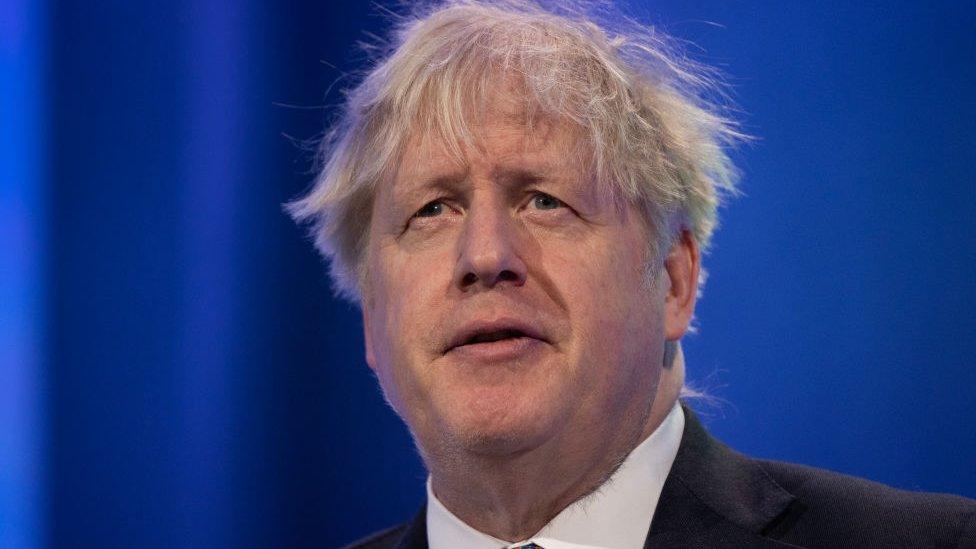Government to launch legal bid to stop Covid inquiry seeing Johnson WhatsApps
- Published

The UK government is to launch an unprecedented legal challenge over the Covid inquiry's demand for WhatsApp messages and documents.
The government missed a 16:00 deadline to share Boris Johnson's messages and notebooks from during the pandemic.
It is thought to be the first time a government has taken legal action against its own public inquiry.
Mr Johnson said he would be "more than happy" to give the unredacted material directly to the inquiry's chair.
The Cabinet Office - the department that supports the prime minister in running the government - had until 16:00 on Thursday to hand over all documents requested by the Covid inquiry.
But the government refused to disclose some of the material by arguing it was not relevant to the inquiry, it would compromise ministers' right to privacy, and would set a precedent that could prevent ministers discussing policy matters in future.
Crossbench peer and retired judge Baroness Hallett, who is the inquiry's chair, says it is up to her to decide what material is relevant.
Mr Johnson has not disclosed any WhatsApp messages sent before April 2021 because his mobile phone was involved in a security breach and has not been turned on since, his spokesman said.
The former prime minister has written to the Cabinet Office asking whether security and technical support can be given so that content can be retrieved without compromising security, the spokesman added.
In a highly unusual move announced after the 16:00 deadline had passed, the Cabinet Office said it would seek a judicial review of Baroness Hallett's order to release the documents.
This means a judge will have to decide whether the inquiry has overreached its legal powers - setting up a potential legal showdown in court just weeks before the inquiry is due to hold its first public hearings.
Ministers set up the Covid inquiry in 2022 and tasked Baroness Hallett with identifying lessons from the government's handling of the pandemic.
Elkan Abrahamson, the lawyer representing the Covid-19 Bereaved Families for Justice group, said: "The Cabinet Office is showing utter disregard for the inquiry in maintaining their belief that they are the higher power and arbiter of what is relevant material and what is not.
"It raises questions about the integrity of the inquiry and how open and transparent it will be if the chair is unable to see all of the material."
Opposition parties have accused Prime Minister Rishi Sunak's government of trying to obstruct the Covid inquiry and urged him to comply with its requests.
Labour's deputy leader, Angela Rayner, branded the legal challenge a "desperate attempt to withhold evidence" and said "these latest smoke-and-mirror tactics serve only to undermine the Covid Inquiry".
The Liberal Democrats said the legal challenge was "a kick in the teeth for bereaved families who've already waited far too long for answers".
Inquiry powers tested
Some senior Conservative MPs had urged the government to back down to avoid a lengthy legal battle with the Covid inquiry.
Science minister George Freeman defended the decision to take legal action, while conceding he personally thought a defeat in the courts was likely.
But when speaking during a visit to Moldova earlier, Mr Sunak said he was "confident" in the government's position.
Outlining its grounds for legal action, external, the Cabinet Office said ministers and officials "should not be required to provide material that is irrelevant to the inquiry's work".
It said "irrelevant material" requested by the inquiry included "references to personal and family information, including illness and disciplinary matters", and "comments of a personal nature about identified or identifiable individuals which are unrelated to Covid-19".
But the danger for the government is that it exposes it to the charge - already levelled by Labour - that ministers are trying to cover something up.
The legal action will test the ability of public inquiries to get hold of messages on WhatsApp, which has become an increasingly popular means of communication between ministers in recent years.
Baroness Hallett has previously warned that a failure to disclose material requested by the inquiry would be a criminal offence.
Jonathan Jones, a former head of the government's legal department, said the Cabinet Office had "a plausible case" but faced "an uphill challenge to overturn what are very wide powers of the inquiry".
He told the BBC the matter could be settled in court "within weeks, if not sooner".